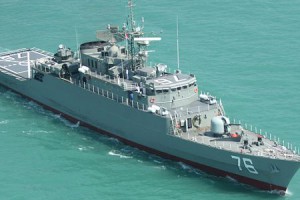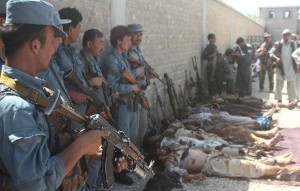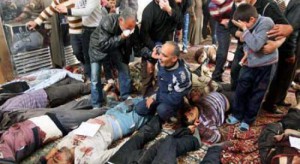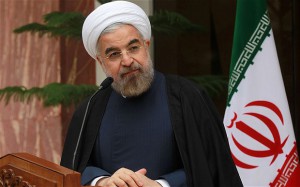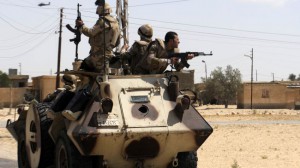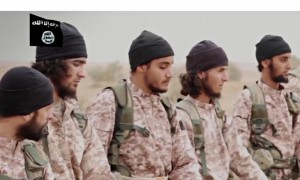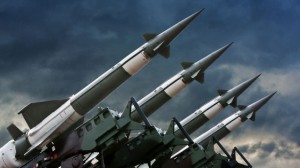DAILY MEDIA
THURSDAY 9 APRIL 2015
NRDC-ITA
Iran sends a destroyer and another naval ship to water off Yemen , raising stakes
Iran dispatched a destroyer and another naval ship to waters off Yemen on Wednesday, raising the stakes amid a Saudi-led air campaign targeting Iranian-backed Shiite rebels fighting forces loyal to the country’s embattled president, wrote AP.
The Iranian maneuver came as the U.S. deepened its support for the Saudi-led coalition, boosting weapons supplies and intelligence-sharing and carrying out the first U.S. aerial refueling mission of coalition fighter jets.
The Iranian warships were sent to the strategic Bab al-Mandab strait as part of an anti-piracy campaign to “safeguard naval routes for vessels in the region,” Iranian Rear Adm. Habibollah Sayyari was quoted as saying by the English-language state broadcaster Press TV.
Securing navigation in the narrow strait was a key reason for the Saudi-led air and maritime blockade that began after Yemen’s internationally recognized president, Abed Rabbo Mansour Hadi, fled the country two weeks ago as the rebels closed in on Aden, Yemen’s second-largest city where he was based.
The fighting has pitted forces loyal to Hadi against the Shiite rebels, known as Houthis, and allied military units who back ousted President Ali Abdullah Saleh. Critics say Shiite powerhouse Iran backs the Houthis, though both the Islamic Republic and the rebels deny any direct military assistance.
On Wednesday, Iranian Parliament Speaker Ali Larijani condemned the Saudi government, accusing it of committing crimes against humanity in Yemen during airstrikes that hit civilian areas. His comments, carried by the official Iran news agency, came as Iranian diplomats worked to erode support among Sunni nations for the air campaign, visiting Pakistan and Turkey, both supporters of the Saudi-led coalition, and Oman, the only Gulf country that has abstained from participating in the military operation.
Pakistan’s parliament is debating a Saudi request to send soldiers to join the Saudi-led coalition.
Speaking in Islamabad, Iranian Foreign Minister Mohammad Javad Zarif said the Islamic Republic was ready to facilitate peace talks in Yemen to form a broad-based government and called for a cease-fire to allow for humanitarian assistance.
“We need to work together to put an end to the crisis in Yemen. The people of Yemen should not suffer from aerial bombardment,” Zarif said.
In Washington, meanwhile, Pentagon spokesman Col. Steve Warren told reporters Wednesday that the U.S. had conducted its first military intervention in support of the Arab coalition, the aerial refueling of Emirati F-16s and Saudi F-15s. He did not provide details, except to say the refueling did not take place over Yemeni airspace.
Speaking a day earlier in the Saudi capital, Riyadh, U.S. Deputy Secretary of State Antony Blinken blamed the violence in Yemen on the Houthis and forces loyal to Saleh, saying the U.S. was committed to defending Saudi Arabia.
“We have expedited weapons deliveries, we have increased our intelligence-sharing, and we have established a joint coordination and planning cell in the Saudi operations center,” he said after meeting with Saudi royals and Hadi, the Yemeni president who fled to Saudi Arabia two weeks ago.
Intelligence-sharing includes making available raw aerial imagery the coalition can use to better strike anti-Hadi forces, said a U.S. defense official who was not authorized to comment publicly.
Warren said the munitions, mostly “bombs and guidance kits,” were in the pipeline but had not yet been delivered.
Analysts said Wednesday’s move by Iran to send warships to Yemeni waters was posturing by the regional powerhouse.
“The Iranian navy has regularly sent warships to the Gulf of Aden to protect its ships from pirates,” Iranian political analyst Davoud Hermidas Bavand said. “But given the timing, the dispatch of a destroyer is seen as … muscle-flexing by Iran.”
Mustafa al-Ani, a Gulf security expert with closes to the Saudi government, said the Iranian destroyer had been in the area before, as part of an anti-piracy force. But with its dispatch Wednesday, the Iranians were signaling that they have seaborne capabilities, he said.
“They are sending messages that we are going to be involved sooner or later if the war is going on. We have the capability to do that,” he said.
In Abu Dhabi, the capital of the United Arab Emirates, a leading partner in the Saudi-led coalition, Emirati Foreign Minister Sheikh Abdullah bin Zayed Al Nahyan said Iran’s meddling in several Arab countries, including Yemen, left little hope for cooperation. He characterized the conflict as part of a broader pattern of Iranian efforts to expand its influence in the region.
“It’s not about sectarianism. It’s about Iran believing in exporting the revolution. It’s a part of their regime, a part of their ideology. Until they choose to deal with us country to country, we will have suspicions,” he said.
The U.S. says the chaos in Yemen has allowed the local al-Qaida branch, which it considers the world’s most dangerous wing of the group, to make “great gains” on the ground, causing Washington to rethink how it prevents it from launching attacks in the West.
Speaking in Tokyo, Defense Secretary Ash Carter said the collapse of the central government in Yemen makes it harder to conduct counterterrorism operations against al-Qaida, which has ambitions to strike Western targets, including the United States.
On Wednesday, al-Qaida in Yemen, a staunch rival of the Houthis, posted a video offering a bounty of 44 pounds (20 kilograms) of gold for whoever captures or kills the rebel leader and his prime ally in Yemen, ousted president Saleh.
Along with the ongoing military campaign, Arab countries have lobbied members of the U.N. Security Council to adopt a draft resolution that would ban arms shipments to the rebels and their allies. The draft calls on all parties to resolve their differences through dialogue and accelerate U.N.-brokered negotiations on a political transition.
Meanwhile, the first boats carrying medical aid to Yemen since the March 26 start of the Saudi-led bombing campaign arrived in the southern port city of Aden on Wednesday.
The head of Doctors Without Borders in Yemen, Marie-Elisabeth Ingres, said the ship carried some 2.5 tons of supplies from Djibouti for its hospital in Aden.
The Geneva-based spokeswoman for the International Committee of the Red Cross, Sitara Jabeen, said another boat carrying five of its staff and five medical workers as well as hundreds of pounds of medicine also made it into the embattled city.
Jabeen said a plane carrying tons of medical supplies has been held back by complicated negotiations for securing a safe landing in the capital, Sanaa.
The World Health Organization said Wednesday that at least 643 civilians and combatants have been killed in the fighting since March 19.
Afghanistan: senior Taliban commander among 10 killed in Laghman
A senior Taliban commander has been killed with nine of his companions in an aerial strike in eastern Laghman province wrote Khaama.
A statement issued by the media office of Laghman province states that the strike was conducted on a group of insurgents in the mountainous area of Bomby in Dawlat Shah area around 11:30 AM today.
The statement adds that Noor Shah Chapaw, Zakir and Sadullah were among the ones killed in the strike.
According to the statement Noor Shah Chapaw was the so-called Taliban governor for Dawlat Shah District and general commander for Dawlat Shah, Alishang and Badpakh districts.
The statement further states that the group was involved in several terrorist activities in the ar
Palestinian envoy: ‘military’ option agreed for Syrian camp against Islamic State
A Palestinian official says an agreement has been reached with the Syrian government to use military force to expel ISIS militants from an embattled Palestinian refugee camp in Damascus, wrote DailyStar.
Palestinian Labor Minister Ahmad Majdalani told the Voice of Palestine Radio that “we have agreed with the Syrian government on ways to force the terrorist group ISIS out of the Yarmouk refugee camp.”
He says “the military solution is the only one to force these terrorists out” of Yarmouk, which ISIS militants largely overran last week.
Majdalani is leading a West Bank delegation to Damascus to address the Yarmouk crisis.
Majdalani also says the Syrian government has agreed to ensure safe passage to refugees in Yarmouk and to provide them with shelter outside the camp.
ISIS prevents women and children of Hīt from leaving and takes them as human shields
The Islamic State of Iraq and Syria “ISIS” organization has prevented on Thursday, residents of Hīt city western Anbar (especially women and children) from leaving, according to Shafaaq, and has imposed harsh punishments, as reported by activists.
“ISIS organization started to prevent people in Hīt to enter and leave from it and put harsh sentences to take them as human shields ,” Activists from Anbar said in a telephone call to “Shafaq News”.
ISIS militants have controlled cities in Anbar province, after a sudden attack last June on Mosul city.
A large military operation has been launched yesterday in Anbar cities to liberate it from ISIS terrorists after the Iraqi forces regained Tikrit city
Iran wants all sanctions lifted, or “no deal”
Iran will agree to a final nuclear accord with six major powers only if all sanctions imposed on the country over its disputed nuclear work are lifted, President Hassan Rouhani said in a televised speech to Reuters.
“We will not sign any deal unless all sanctions are lifted on the same day … We want a win-win deal for all parties involved in the nuclear talks,” Rouhani said.
The tentative deal between Iran and the six powers on curbing Iran’s nuclear work, reached a last week in the Swiss city of Lausanne, revived hopes of an end to sanctions in return for limits on the Iranian atomic programme.
Iran wants sanctions to be lifted altogether and at once, but the United States made it clear on Monday that sanctions would have to be phased out gradually under the final nuclear pact.
A deadline for reaching the final agreement is June 30 and Iran, the United States, Germany, France, Britain, Russia and China are expected to meet in the coming days to discuss the deal.
Anonymous reveals US and UK host Islamic State websites
This is the latest in a string of recent actions dubbed #OpISIS, in which the hackers — in particular an Anonymous faction known as GhostSec — have taken aim at the online resources of the internet-savvy ISIS propagandists, wrote Abna24.
The hackers note that US-based Cloudflare is the “by far worst offender” on the list, which also includes Yahoo!, Google and GoDaddy. OVH, the largest web hosting service in Europe, and LeaseWeb also make an appearance on the list.
On the site where the list was posted, GhostSec explained the action:
“It is our sincerest hope that the media use this as a tool to show the world that the so-called the Islamic State is everywhere in some shape or form and that companies are unaware of their customers content or they turn a blind eye for easy profit and choose to accept bloodmoney.”
To date, as part of their cyber campaign against IS, Anonymous claims to have attacked more than 200 websites, and “destroyed” 85 of them.
This release follows the release in March of 9,200 twitter handles associated with the militant group in which another group CtrlSec also participated, and an April 5 release of 4,300 more.
Involved in the March release was anti-terror cyber-activist @XRSone, who also released a database — developed by a different anonymous individual — of over 25,000 accounts he claimed were connected to ISIS supporters.
“It’s tracking 25,000 accounts on its own,” XRSone told IBTimes UK. “There is so much information within it I had to reach out to have someone who can read Arabic verify accounts for me. This is probably as big as it gets and it proves if one person can do it, the government or Twitter certainly can.”
Actions such as these do have their critics, however, with some questioning how many innocent accounts are getting swept up in the cyber-dragnets at a rate inappropriate for a public listing.
After the March release of Twitter accounts, US Representative Ted Poe (R-Texas) released a joint statement with four other congressmen, urging the social media giant to increase its efforts to identify accounts being used for terrorist propaganda.
“Twitter is far behind other social media companies in combating this threat,” Poe said. “Twitter needs to do more. It’s time to put a stop to this cyber jihad.
However, ISIS accounts are proving difficult to eradicate. The group creates multiple swarm accounts, all promoting each other. By the time Twitter suspends one account, three more may have sprung up in its place, and ISIS’ Twitter network continues to thrive.
Last month, the ISIS threatened the life of Twitter co-founder Jack Dorsey, in retaliation for certain steps the company has managed to take to stifle accounts related to the group.
“We told you from the beginning it’s not your war, but you didn’t get it and kept closing our accounts on Twitter, but we always come back,” read a post on a website used by the terrorist group. “But when our lions come and take your breath, you will never come back to life.”
Attacks kill police and civilians in Egypt’s Sinai
Missile, mortar and bomb attacks in Egypt’s Sinai Peninsula have killed police officers and civilians, military officials say to Al Jazeera.
Officials told the Associated Press news agency mortars landed in a residential area south of Sheikh Zuweid on Wednesday, hitting a house and killing nine of it residents.
Sheikh Zuweid lied between the provincial capital, El Arish, and Rafah on the border with Gaza.
In a separate attack, officials said a missile landed on a house in another village, killing two civilians.
In a third attack, outside El Arish, officials said an explosive detonated as a military vehicle drove past, killing two police officers.
The officials spoke anonymously because they were not authorised to speak to the media.
Egypt has conducted a long-running campaign in Sinai against fighters from the group formerly known as Ansar Beit al-Maqdis but who are now fighting under the banner of the Islamic State of Iraq and the Levant.
Early in April, a series of ambushes targeting the military killed 15 soldiers and two civilians.
The army said 15 of the attackers were also killed in the clashes.
That was the deadliest attack in Sinai since suicide car bombers and gunmen killed several dozen soldiers at a military base in El Arish in January.
50 % of European terrorists in Islamic State group in Iraq and Syria are French
Approximately fifty percent of the European Takfiri terrorists who have joined the ISIL Takfiri group in Iraq and Syria are French, a report by Abna24 says.
According to the report revealed by Senator Jean-Pierre Sueur, a member of Frances’s upper house of the parliament, Senate, on Wednesday, in excess of 1,430 French individuals, 47 percent of European militants, have traveled to the Middle Eastern countries of Iraq and Syria to join the terrorist group.
Sueur also disclosed that the French intelligence services are monitoring over 3,000 French individuals suspected of having connections with terrorist groups in Syria.
The report also says that as many as 85 French nationals have been killed in the ongoing conflicts in the areas under the control of the ISIL Takfiri group, and at least two French nationals are being held in Syria.
The French officials further noted that 200 French nationals have left the battle zones for France, prompting fear that they can commit acts of terrorism in the country.
Sueur further said that a total number of 152 extremist are currently held in jails in the country.
Some 1,400 people living in France have either joined militancy in Syria and Iraq or are planning to do so, French Prime Minister Manuel Valls said in January.
According to a report by the United Nations, over 25,000 militants from more 100 nations have joined al-Qaeda and ISIL Takfiri militants in Iraq and Syria and other countries.
The analysis, which was carried out by a panel of experts monitoring UN sanctions against al-Qaeda, shows that the number of foreign terrorists spiked by 71 percent between mid-2014 and March 2015, the Associated Press reported on April 1.
Syria and Iraq were the destination for over 20,000 of the militants, where they went to join ISIL and the al-Nusra front, the report added.
The Takfiri extremists currently control parts of Syria and Iraq. They have carried out atrocious crimes in the two countries, including mass executions and the beheading of people.
Sale of missiles for counter-terrorism operations inside Pakistan
The US has defended a proposed arms deal with Pakistan worth nearly a billion dollar to sale attack helicopters and missiles, saying the weapons would be used for internal counter-terrorism operations, wrote DeccanHerald. .
“This proposed sale of helicopters and weapons systems will provide Pakistan with military capabilities in support of its counter-terrorism operations inside the country,” State Department Deputy Spokesperson Marie Harf told reporters.
“They are for internal counter-terrorism uses inside Pakistan – so to be very clear about that, going after terrorists inside their own country,” she said. The USD 952 million deal approved by the State Department involves the US supplying Pakistan with 15 AH-1Z attack helicopters, 1,000 Hellfire missiles, engines, targeting and positioning systems and other equipment.
“We obviously have many ways of monitoring how weapons we sell to any country are used in terms of end use and how we monitor that. That’s obviously something we care very deeply about,” Harf said when asked whether the US is confident that Pakistan is going to use the aid for the purposes in which it is being sold and not against India. “Do you trust the Pakistanis?” she was asked.
“This isn’t about trust. This is about being able to see where our weapons go, see what they’re used for, and that’s something we are confident we are able to do,” she said.
“We have a very close counter-terrorism relationship with Pakistan for very good reasons. There’s still a serious threat in Pakistan from terrorists who have either attacked the US or American soldiers in Afghanistan, who have tried to plot and plan against the West, including the US,” she said.
“Obviously, the remnants of core al-Qaeda are mainly in the tribal areas of Pakistan. So the Pakistanis have a serious problem still, and that’s why we’re trying to help them. This is in our national security interest to do so,” she said.
In a statement, the Defense Security Co-operation Agency yesterday said the proposed sale of helicopters and weapon systems will provide Pakistan with military capabilities in support of its counter-terrorism and counter-insurgency operations.
Pakistan’s volatile northwest has been fiercely battling homegrown Taliban insurgency that was revived in 2004. The country’s army have been engaged in a full-scale offensive against the militants in North Waziristan since last year.
